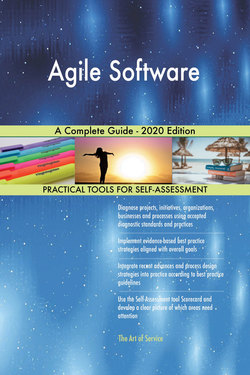Читать книгу Agile Software A Complete Guide - 2020 Edition - Gerardus Blokdyk - Страница 7
На сайте Литреса книга снята с продажи.
ОглавлениеCRITERION #1: RECOGNIZE
INTENT: Be aware of the need for change. Recognize that there is an unfavorable variation, problem or symptom.
In my belief, the answer to this question is clearly defined:
5 Strongly Agree
4 Agree
3 Neutral
2 Disagree
1 Strongly Disagree
1. Do you need quantum computing to create human level AI?
<--- Score
2. How much flexibility does your software need?
<--- Score
3. How do scaling issues affect the manner in which you fulfill your goal of identifying your initial scope?
<--- Score
4. Do you need quantum computing for consciousness?
<--- Score
5. Why do you have problems keeping things simple?
<--- Score
6. Whom do you really need or want to serve?
<--- Score
7. What prevents you from performing your work as efficiently as possible?
<--- Score
8. What are the expected benefits of Agile software to the stakeholder?
<--- Score
9. Why do you need to write additional tests?
<--- Score
10. As a sponsor, customer or management, how important is it to meet goals, objectives?
<--- Score
11. How are the Agile software’s objectives aligned to the group’s overall stakeholder strategy?
<--- Score
12. Which information does the Agile software business case need to include?
<--- Score
13. How do alternate target architectures eliminate the problems of the current architecture?
<--- Score
14. How do you address challenges to deliver software that your business needs?
<--- Score
15. How many supply boxes will you need?
<--- Score
16. Who else hopes to benefit from it?
<--- Score
17. Are you looking for an internationally recognized certification in agile software testing?
<--- Score
18. What are the stakeholder objectives to be achieved with Agile software?
<--- Score
19. Are the identified requirements relatively stable and clear?
<--- Score
20. How do you prevent testing gaps across the full system integration?
<--- Score
21. What situation(s) led to this Agile software Self Assessment?
<--- Score
22. How much architectural activity will a project need?
<--- Score
23. What Agile software events should you attend?
<--- Score
24. How can readers be prevented from using versions?
<--- Score
25. How much are sponsors, customers, partners, stakeholders involved in Agile software? In other words, what are the risks, if Agile software does not deliver successfully?
<--- Score
26. What system qualities need to be delivered & when?
<--- Score
27. Are there any specific expectations or concerns about the Agile software team, Agile software itself?
<--- Score
28. Are there recognized Agile software problems?
<--- Score
29. How are you going to measure success?
<--- Score
30. What does Agile software success mean to the stakeholders?
<--- Score
31. How much storage and MIPS do you need?
<--- Score
32. What if your business needs are still emerging and certain aspects of the system are rapidly changing or cannot be defined yet?
<--- Score
33. Are there other common software architecture problems?
<--- Score
34. What problems are you facing and how do you consider Agile software will circumvent those obstacles?
<--- Score
35. What would happen if Agile software weren’t done?
<--- Score
36. What problems arise from the current architectural practices?
<--- Score
37. What extra resources will you need?
<--- Score
38. How to prevent the architecture from gradually degrading over time?
<--- Score
39. How much of an explicit description of the architecture does the project need?
<--- Score
Add up total points for this section: _____ = Total points for this section
Divided by: ______ (number of statements answered) = ______ Average score for this section
Transfer your score to the Agile software Index at the beginning of the Self-Assessment.
